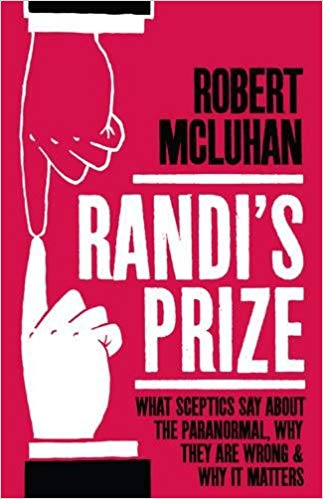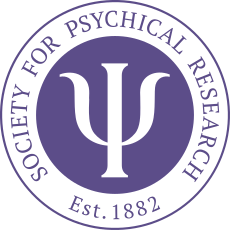
Publication Details
ISBN-13: 978-1848764941
Publish date
Reviewed by Tom Ruffles
To the outsider, the intricacies of serious paranormal research and the commentaries on it by sceptics can seem arcane. Criticism and defence can become increasingly convoluted, often requiring technical expertise to get to grips with the issues. It can eventually all come to seem sterile and pointless, not worth the effort to unravel what, if anything, is going on. Enter Robert McLuhan, who cuts through the fog to take a look at the sceptics (or perhaps rather pseudo-sceptics) and the rhetorical tricks they employ which so often are more concerned with dismissing evidence to their own satisfaction than seeking the truth. It transpires that the two sides are not symmetrical, and those who are sympathetic to psi claims tend to have a better understanding of opposing positions than vice versa.
The book’s title is catchy, but while James Randi is a prominent figure in the text, it is not particularly about his Million Dollar Challenge, and does not go into its mechanics. Instead, the book charts McLuhan’s journey of discovery as he examined the sceptical literature and found it wanting. He noted that assessments of the entire field were often based on superficial analysis of a narrow range of cases which came up again and again. By contrast the psychical research literature was far more extensive, richer and impressive than the sceptics would have the casual reader believe.
McLuhan examines a wide range of phenomena, such as mediumship; laboratory experimentation; out-of-body and near-death experiences; how psychic abilities might operate in the world (what they mean for those who experience them); what makes sceptics tick, and much more. He takes a number of debates between those on either side of the divide, such as Rupert Sheldrake and Richard Wiseman (animals who know when their owners are coming home), and Gary Schwartz and James Randi (star mediums), and analyses the sceptical approach to see how adequate it is in critiquing the psychical research material.
For example, poltergeist cases, such as the Tina Resch and Seaford cases, tend to be far more detailed than one would think from sceptical accounts. Yet such misrepresentation becomes part of the standard narrative, endlessly regurgitated as if it were the last word required on the subject. When Randi ‘investigated’ Tina Resch in Columbus, Ohio, it turned out that he was not allowed in the house and had not carried out significant interviews, but had based his verdict on a second-hand study of visual material. A little digging throws up a more intriguing story than you would infer from reading Skeptical Inquirer, and McLuhan duly provides the wider context. He adds that this case is also an example of the tendency to suggest a guilt by association, the implication being that Resch’s significant legal problems later retrospectively made the poltergeist case still less trustworthy (“see, told you so, a bad ‘un all along”). But that is as patently unfair as it would be if I were to say that all CSICOP Fellow Robert Baker’s work should be ignored on the grounds that he turned out to be a plagiarist.
Clearly there is a double standard (to put it politely) in the sceptics’ approach, which McLuhan pulls out neatly, basing what they consider to be definitive conclusions on a superficial examination of the evidence with the admixture of broad assumptions, the whole topped off with a dash of cheap derision. They would jump with glee if they caught psi proponents doing the same thing. Of course sceptics do play a positive role in keeping parapsychologists on their toes by ensuring that experiments are as rigorous as possible. Parapsychological standards tend to be much higher than for other areas of research, but for the die-hard sceptics it is never enough.
McLuhan introduces the concept of “rational gravity”, the process used by sceptics to restore normality by manufacturing normal scenarios for anomalous events, even if on closer inspection they turn out to be weak or even implausible (the flipside is irrational gravity, the wish for a paranormal explanation to be true even when the facts do not bear the interpretation, which is also a problem). Beginning with an a priori assumption and forcing the evidence to fit it - or dismissing it if won’t fit - makes scepticism seem more like a theological position than a scientific tool for better understanding the world.
Dismissing parapsychology as pseudoscience is a powerful weapon as it conjures up images of ignorance and stupidity - and who wants to be considered ignorant and stupid, or naïve, or credulous, or any of the other hot buttons sceptics press? By creating a climate of easy dismissal, those people who are potentially interested but uninformed are not likely to bother to make the effort to weigh up the evidence for themselves. Time is short, so what is the point wasting it on bunk and flim-flam? The sceptics don’t even have to read the stuff themselves but can pull out a few stock verdicts which vaguely fit in order to dismiss it.
However, it is important not to bracket all sceptics together and there is a danger of in-group/out-group polarisation which distorts the wide range of views represented by both proponents and opponents of psi. Chris French is a world away from Randi, for example, and I have seen him amicably share a platform with Sheldrake in a way I could not imagine Randi doing. Randi is certainly an extreme example of the reflexive debunking tendency, and McLuhan mentions a few others who should rightly be lumped in with him. His list though includes Joe Nickell, who in my experience is a careful investigator. Perhaps significantly, Nickell and French do not figure much in the book.
Rather weaker than the dissection of the sceptical approach is the link McLuhan makes between the paranormal and religious experiences, claiming that “psi is not merely a facet of human experience; it is a potential gateway to religious belief”. One can argue that a positive assessment even of the survival evidence need not lead to a religious interpretation of it. I was surprised to see the sentence “As secular critics say, the decline of religion means not that people now believe in nothing but that they will believe in anything.” One wonders who these secular critics are, given that this is very close to Emile Cammaerts's dictum in his study of G K Chesterton about believing in God. It is of course untrue, whoever says it. Anyway, McLuhan may be correct in bringing in religious speculation, but perhaps at this stage it is best not to multiply hypotheses unnecessarily.
The book is well written and clearly sets out sometimes complex ideas. Given that McLuhan wrote the SPR’s Abstracts Catalogue, it is not surprising that he is exceedingly well informed, with a wide range of information that he synthesises into a coherent whole. Mistakes of fact (such as saying that Australian Richard Hodgson was British) are rare. This makes it a reliable primer for the newcomer to the field who wants to get a feel for the range of phenomena within psychical research, as much as it will appeal to those interested in (to adapt the title of Marks and Kammann‘s book on psychics) the psychology of the sceptic.
Scepticism tends to travel in one direction, and McLuhan has done a fascinating job in turning the microscope round. By the end of the book he has decided that much of the evidence for the paranormal is strong. Even if you do not agree with him, at least it will be on the basis of firm information. To enable the interested reader to follow up the issues raised, there is an excellent bibliography. One suspects that Randi’s Prize will not be included on the reading list of the Committee for Skeptical Inquiry, but only because they have already made their minds up.
This book has also been reviewed by James Lumsden-Cook in the Journal of the Society for Psychical Research Vol 75(2).

